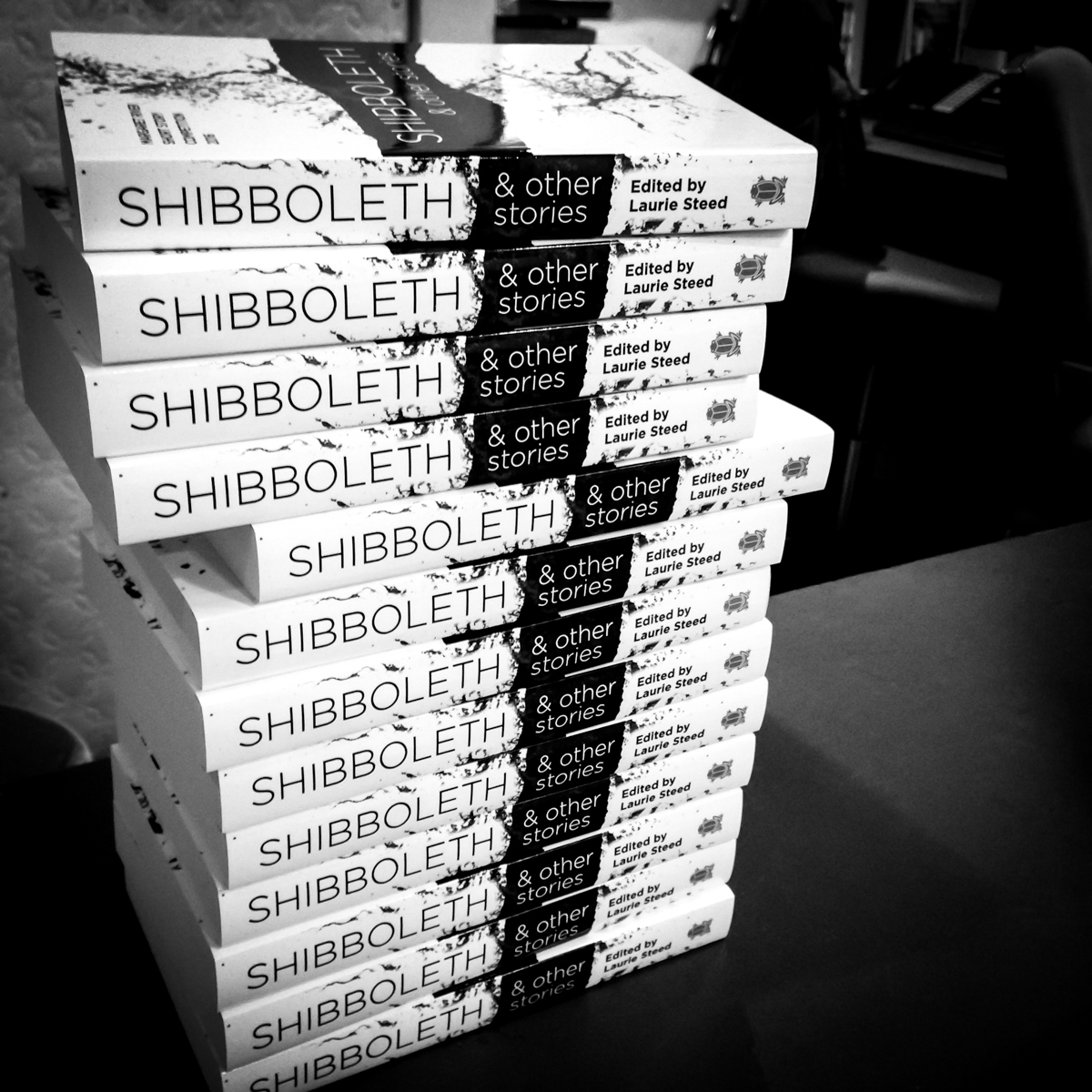It was such a pleasure launching Shibboleth and Other Stories at Gleebooks yesterday. Here’s the speech I gave, along with some fuzzy phone shots I took during the event.
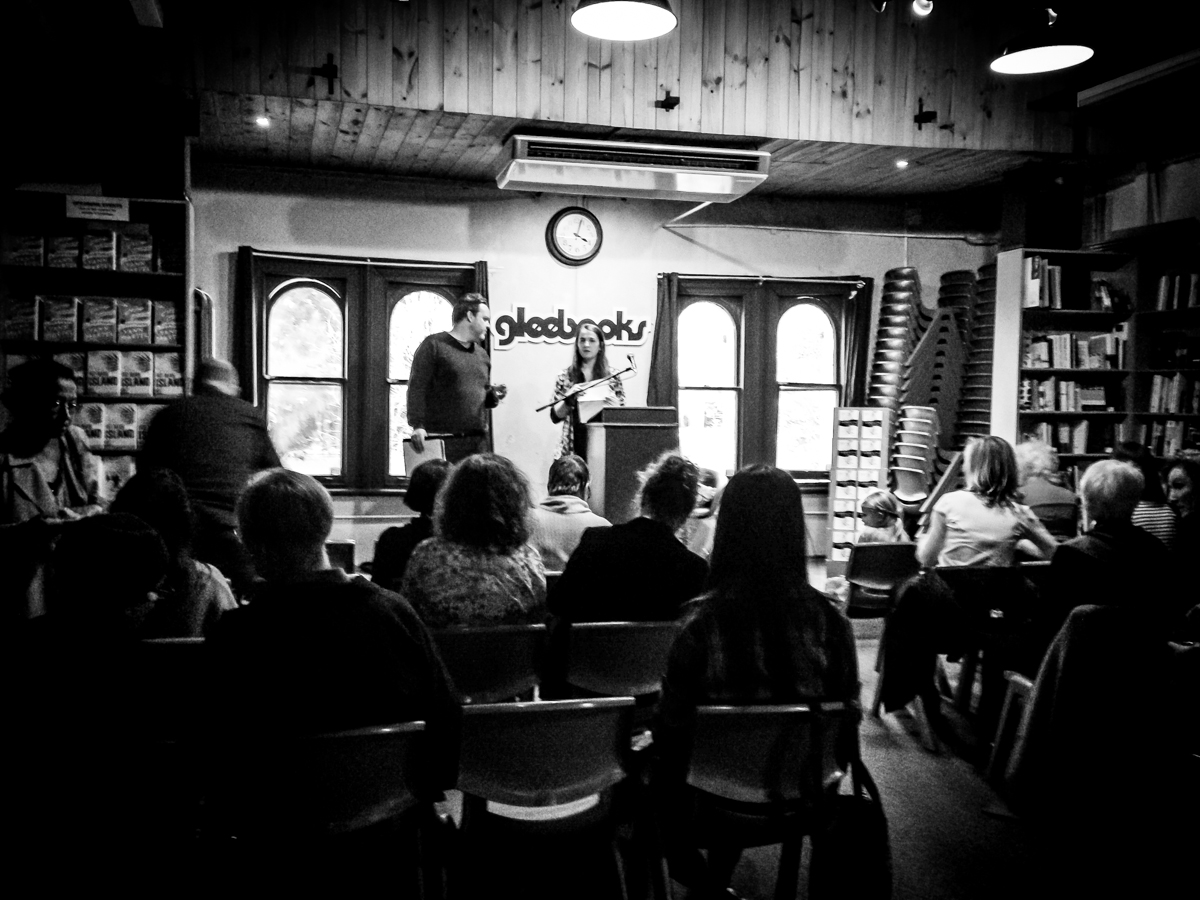
Introduction by Ruby from Gleebooks.
The short story is an art form that causes early death. It’s been proven that every time a person sits down to write a short story, it’s not the sitting, but the act of writing, that is guaranteed to take a year off their lifespan.
It’s no surprise, then, that short story writers, knowing each other’s pain, stick together and jump at the chance to launch each other’s anthologies.
When Laurie first asked me to launch this wonderful book, with this fantastic cover by Susan Miller, I said, ‘Hell, yes!’ – and immediately googled the pronunciation and meaning of ‘Shibboleth’. Shibboleth. Because one of the oldest literary shibboleths around is that if there’s one person you want to launch your tome of everlasting literature at one of the most highly respected bookstores in Sydney – it’s someone who has a very limited vocabulary.
Nevertheless, I’m extremely pleased to be able to launch this anthology on this fine day in Sydney, at one of my favourite bookstores.
There’s particular cause for celebration today because the Margaret River Short Story Competition, which forms the basis for this annual anthology, is now in its fifth year. Over the last five years, editions have featured stories by:
- Vogel Award-winning writer Christine Piper;
- winners of the Age Short Story Award, Louise D’Arcy and Michelle Wright;
- winner of this year’s Victorian Premier’s Unpublished Manuscript Award, Melanie Cheng, whose debut collection of stories will be published next year; and
- recent debut novelists Mark Smith—author of The Road to Winter—and Isabelle Li, author of A Chinese Affair, who is here with us today.
Often many of us assume that the centre of literature in Australia is Melbourne, radiating out to Sydney and Queensland, then to other parts of the country. But Margaret River Press, run by Caroline and John Wood and their team, is a particularly innovative publisher that punches above its weight, nurturing writers at all stages of their careers across Australia. Increasingly, we find ourselves looking far west to hear breaking literary news. Caroline and John and the team are doing precious work also, through this anthology, to preserve the short story in this country – an art form that earns so little money it almost functions outside capitalism, but that is essential to providing a traditional breeding ground for rising literary stars. In a difficult funding environment in which anthologies have struggled to survive, Margaret River Press is doing essential work.
The great thing about having the honour of launching this book in Sydney—during its national launch tour—is that, in true competitive Sydney style, this city has the pleasure of being home to the winner of the Margaret River Short Story Competition for this year, Jo Riccioni, the author of the acclaimed novel, The Italians at Cleat’s Corner Store, which last year won the International Rubery Award for Fiction.
Taking its rightful place as the title story of this anthology, Jo’s piece, which we will have the pleasure of hearing her read from today, follows two people going to the Tate to view Doris Salcedo’s installation, Shibboleth, an artwork that comprises ‘a vast fracture’ ripping through a concrete floor. The story is a deft dance between two characters, with the narrative constantly shifting beneath the reader’s feet, as the pair navigates the fissures left by the memories of a past relationship and the yearning that lingers under surface banter.
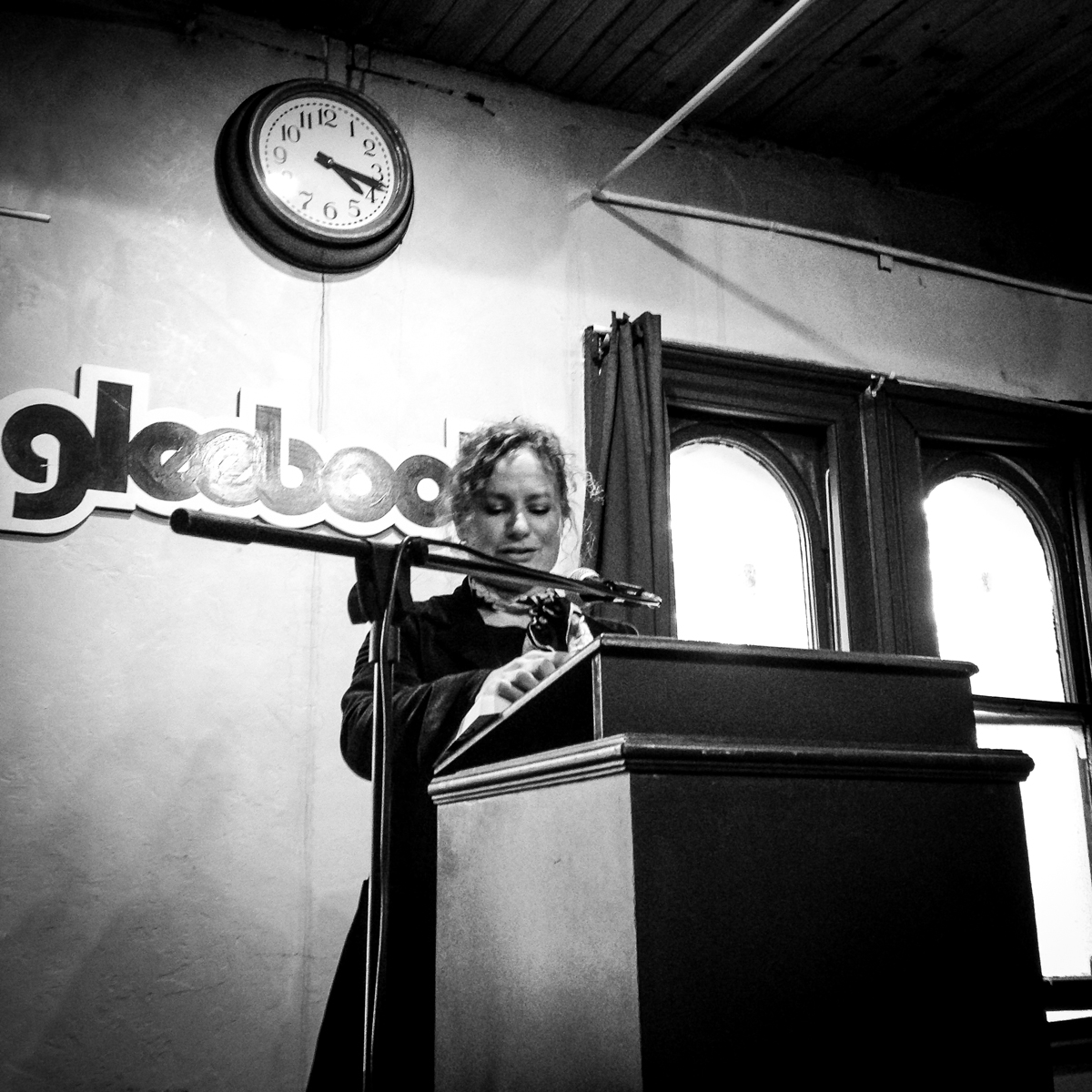
Jo Riccioni reading from ‘Shibboleth’.
This year’s runner-up was Melbourne writer, Magdalena McGuire, with her brilliant story ‘It Used to Be a Boyd’. The story has one of the best, most disorientating openings I’ve read recently:
Most people only get married once or twice. Eight times if they’re decadent. But I get married once a week. Every Wednesday, in fact.
The story explores the gap between the pantomime of wedding ceremonies and the reality of marriage for a nursing home worker.
This year’s winner of the South West Prize was Phil Sparrow, whose moving story ‘Theo’ contains lines I’d wished I’d written myself, including these from the opening:
With each stroke of the knife, my balls swing freely in my waiter’s trousers. … Swish goes the knife, sway go my balls, slap goes the meat.
And a later line that would get anyone by the balls:
I want to tell Theo I love him, but instead, I say thank you.
Besides Jo’s piece, I’d like to highlight the work of three brilliant contributors who are here at the launch today: Catherine, Cassie and Susan.
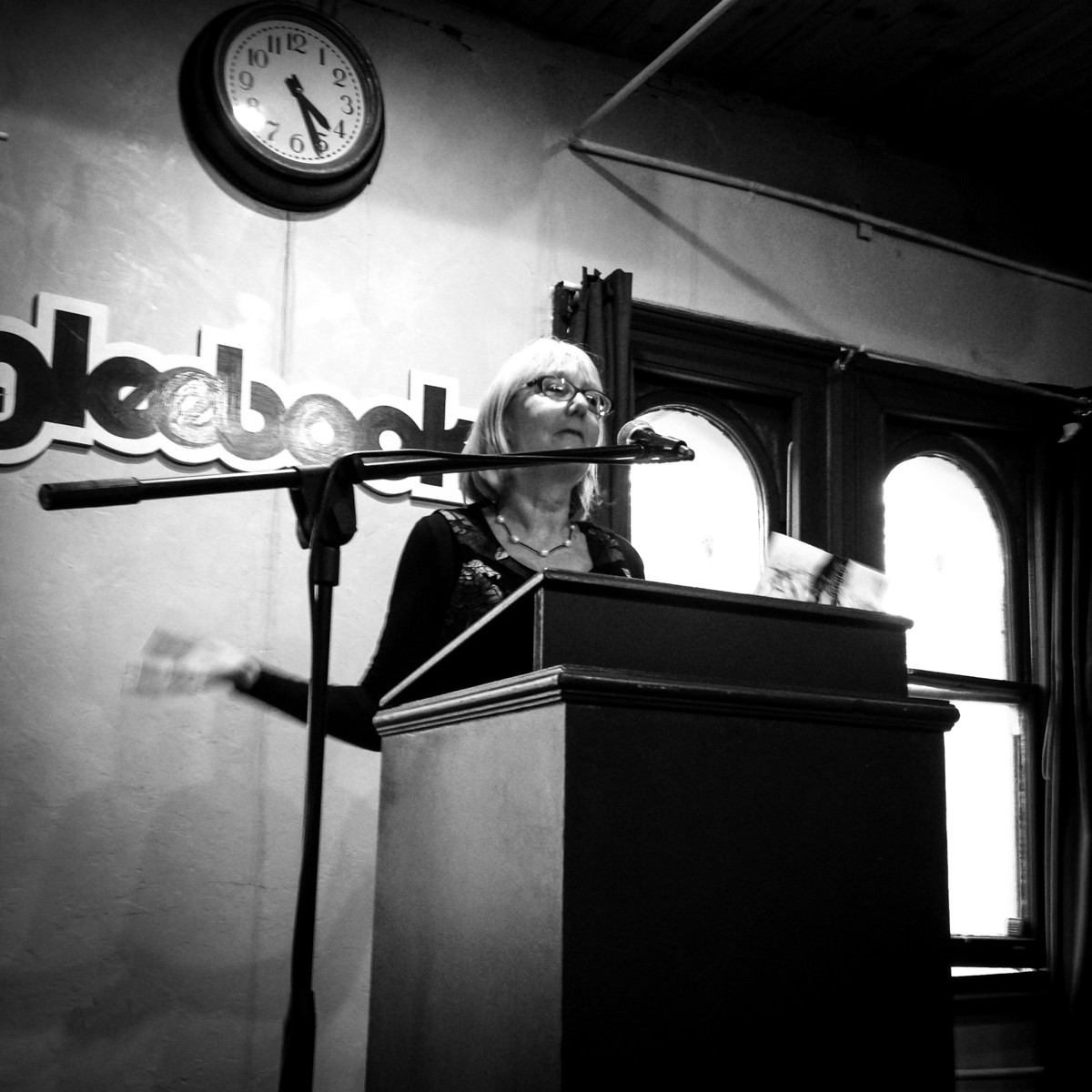
Catherine Moffat reading from ‘Slacklining’.
Catherine Moffat will be treating us to a reading from her wonderful story, ‘Slacklining’, which is about learning to float like an elephant on the slackline of life, even when you’re able to see the cracks in the tiles, which seem to have no logic to the way they have broken.
Cassie Hamer will also be reading from her incredible story, ‘Le Farfalle’, a story I gather from Cassie’s bio was probably composed in her head while she was walking around Centennial Park. It’s a story with an opening to die for, ‘like silk under your fingers’. Centering on a Blue Morpho butterfly with the ability to vanish, the story explores just how much a migrant must put up for sale to fit into an alien landscape.
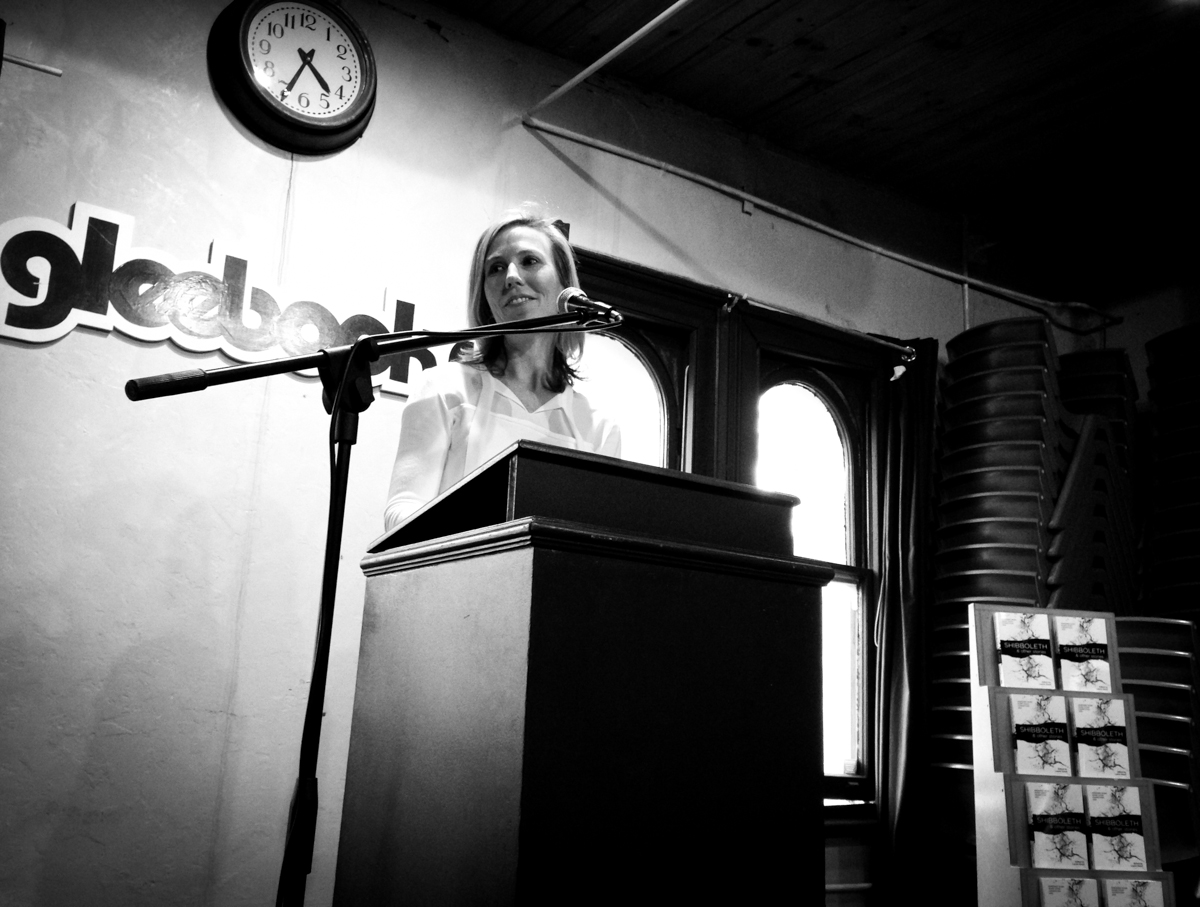
Cassie Hamer reading from ‘Le Farfalle’.
Seasoned short story writer, Susan McCreery, with whom I’ve crossed paths on the short-story scene many a time—and who I recently discovered actually proofread my book Portable Curiosities—has contributed the contemplative piece, ‘Night Shift’, filled with keen insights into processing and surviving infidelity, down to the details of feeling like second-hand furniture, and waiting for that one piece of indisputable evidence.
The rest of the stories in this year’s anthology are equally compelling. Also covering the territory of infidelity are:
- Catherine Noske’s ‘Brown Snake’, with its intriguing focus on ‘how a man can disappear when he still makes it home for dinner’;
- ‘Flight’ by Penny Gibson, which explores what truth we should tell in our final days when it comes to love; and
- ‘The Boat’ by Leslie Thiele, a story in which the midlife-crisis-style purchase of a boat frames a meditation on loneliness and stability within marriage.
Another recurring theme is memory loss, explored in:
- ‘The Memory Mirror’ by Georgina Luck, about a man who holds a memory competition but starts to lose his own mind; and
- ‘All the Devil’s Weed Plants’ by Mikaela Castledine, a beautifully strong piece of writing that examines the difficulty of looking after a loved one whose mind is disappearing.
Many of the stories are built around powerful central images that linger long after you turn the last page. ‘The Sea Also Waits’ by talented emerging Perth writer, Emily Paull, centres on a son timing with a stopwatch his mother’s free dive into the depths of the ocean. A story by the acrobatic writer, Laura Elvery—famous in short story circles for achieving the near-impossible feat of being shortlisted three times (in four years) for the Overland Victoria University Short Story Prize—centres on a small girl walking a tightrope above Federation Square. A central concept in Chloe Wilson’s brilliant story, ‘The Drydown’, is perfume, and the elements that linger in fragrances and family ties. Rachelle Rechichi’s highly original story, ‘Composition’, exploring broken childhoods and adult lives, leave us with the image of a doll with its eyes burnt out. Melanie Cheng’s story features the rare albino sparrow – exploring the tension between husband and wife, and their feelings about their child, born with a port wine stain on his face. And ‘Photographs of the Missing’ by Michelle Wright, author of the new short story collection Fine, shows through photos the contrast between the innocence of childhood and the realities of later life.
Other striking images include that of:
- a beautiful young fawn in a forest where disturbing crimes occur – in Julie Kearney’s unsettling contribution, ‘Fork in the Path’;
- fake animals in a zoo, and giraffes on fire, which mirror a man’s struggle to come to terms with his own authenticity, in Wes Lee’s ‘Thirsty’;
- hibiscus flowers left on the desk of a teacher learning to control his classroom, in Kathy George’s piece;
- a coolbag on a train, holding the gift of a future, in linguist Helen Renwick’s ‘The Treasure Box’;
- a house that holds cherished memories, and whose groaning floorboards mirror grief, in Kate Glenister’s moving story;
- elaborate fantasies in ‘Let’s Pretend’ by Mirandi Riwoe – which provide insights into a character’s desire to escape her limiting circumstances; and
- a hollowed-out tree which offers a final resting place for babies who die before they grow teeth, in a haunting story by Sue Robertson.
Reading this collection was an enriching experience, and I’d particularly like to congratulate Laurie for putting together such a brilliant anthology.
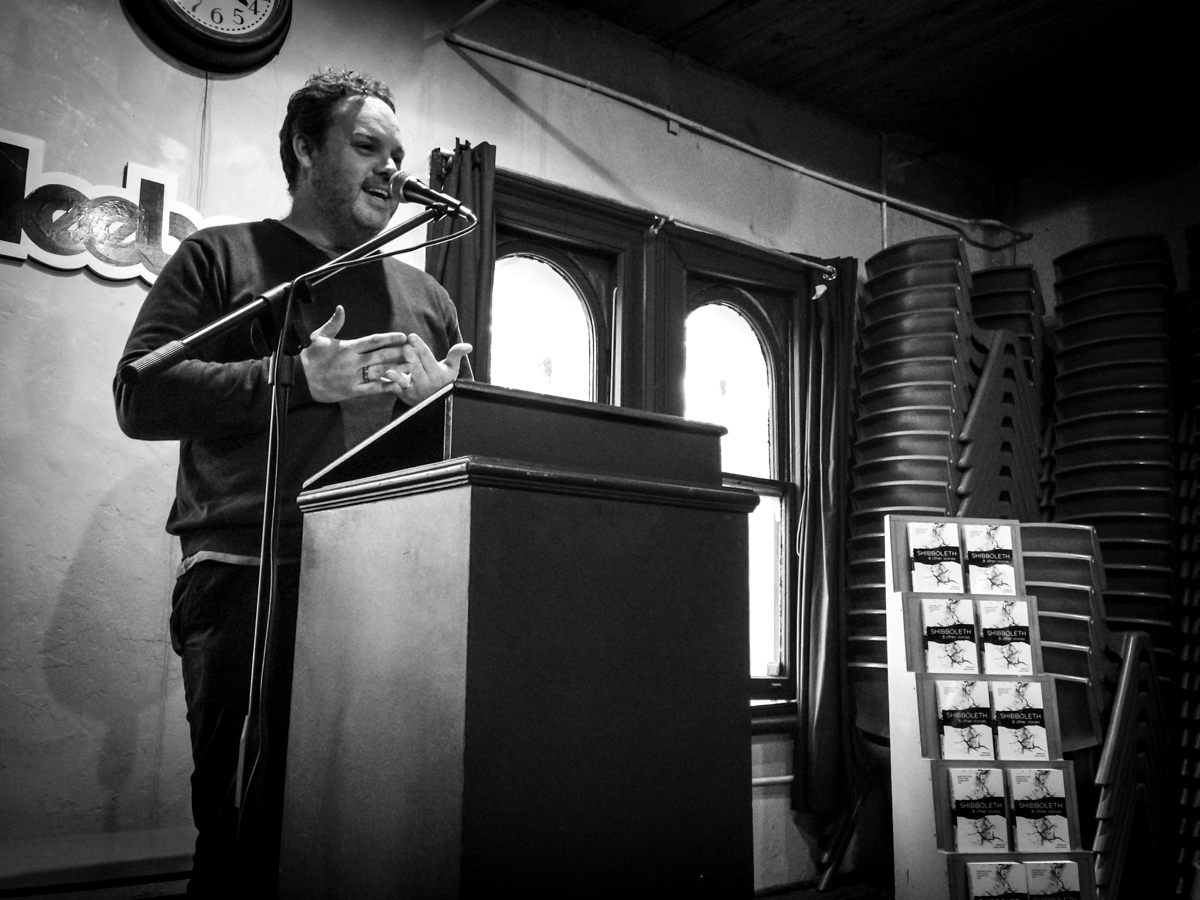
Laurie Steed discussing the selection process.
I actually met Laurie through The Sleepers Almanac a little while ago, and he’s one of the most accomplished, supportive and positive short story writers around. People like Laurie are the glue holding the short fiction community together, helping us to avoid being a ‘knife fight in a telephone booth’ – a description I read recently in an article by Emmett Stinson quoting John Forbes’ view of the Australian poetry scene.
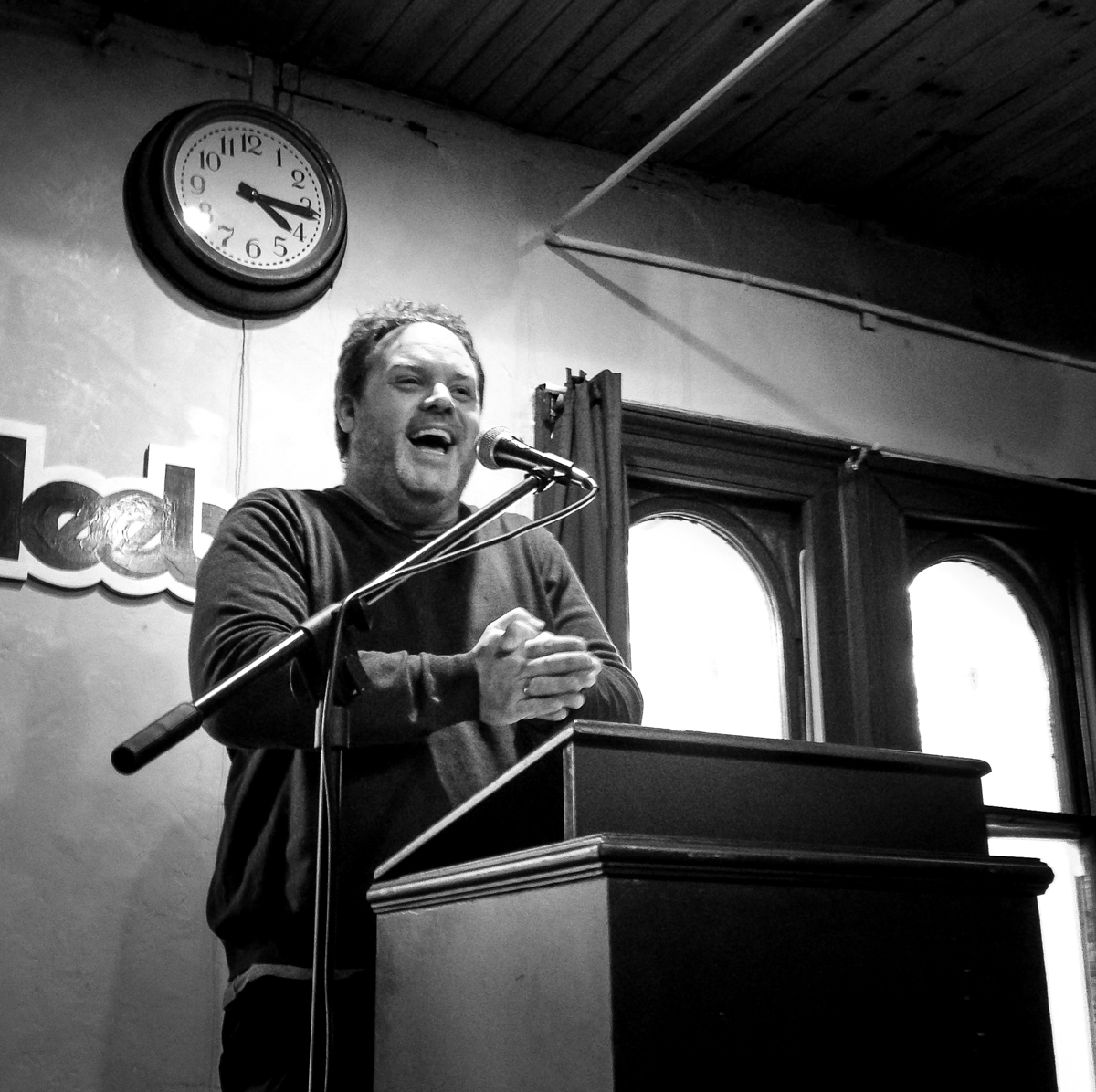
I’ve also recently been given a new insight into the difficulties of editing a multi-author collection – have just completed my twenty-third straight day of editing a new anthology for another publisher. Having now felt the pain of being an editor and never really wanting to go through the experience again unless someone threatens to kidnap one of my non-existent children, I now respect editors like Laurie a thousand times more than I used to.
So kudos to you, Laurie, to Margaret River Press, and to all the contributors here and across the country, for taking a collective year of your lifetimes to put together an incredible anthology that will be here long after we’ve all bled to death over our typewriters.
I officially declare Shibboleth and Other Stories launched in Sydney.
*
Buy a copy of the anthology from places including Margaret River Press and Gleebooks.
